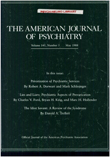Depressive behavior and hyperactive adrenocortical function
Abstract
This study examined relationships between depressive subtypes, clinical- behavioral characteristics, and hypothalamic-pituitary-adrenocortical (HPA) function in 132 hospitalized depressed patients. There were significant positive correlations between several pre- and postdexamethasone plasma cortisol measures and anxiety, psychomotor disturbance, distressed expression, and sleep disturbance. Few significant relationships were seen between illness severity and HPA function. Virtually no endocrine differences were seen between endogenous and nonendogenous subtypes or between psychotic and nonpsychotic subtypes. These results and the previous literature suggest a profile of depressed patients with HPA overactivation; they are likely to be anxious, to have sleep and psychomotor disturbances, to have lost weight in the current episode, and to be older.
Access content
To read the fulltext, please use one of the options below to sign in or purchase access.- Personal login
- Institutional Login
- Sign in via OpenAthens
- Register for access
-
Please login/register if you wish to pair your device and check access availability.
Not a subscriber?
PsychiatryOnline subscription options offer access to the DSM-5 library, books, journals, CME, and patient resources. This all-in-one virtual library provides psychiatrists and mental health professionals with key resources for diagnosis, treatment, research, and professional development.
Need more help? PsychiatryOnline Customer Service may be reached by emailing [email protected] or by calling 800-368-5777 (in the U.S.) or 703-907-7322 (outside the U.S.).



